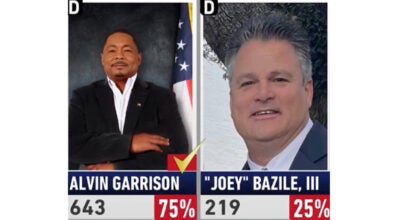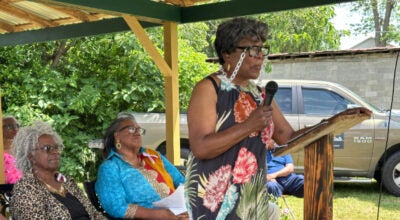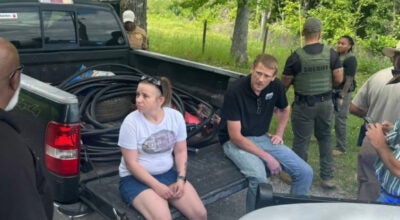Bright Future: Foster hopes to help others through agriculture research
Published 12:07 am Wednesday, July 16, 2014

Matt Foster sprays his grass with water out of a custom-made backpack system used for the dispersal of herbicide Saturday. Foster is a second-year graduate student at Louisiana State University where he is studying agriculture pest management and all things weed science. (Sam Guase/The Natchez Democrat)
Vidalia — The science of exterminating weeds has Vidalia native Matt Foster excited for the future of agriculture in Louisiana.
Foster is a second-year graduate student at Louisiana State University, where he is studying agriculture pest management — or weed science.
Foster, a 2007 graduate of Vidalia High School, decided to continue his studies at LSU after earning his bachelor’s degree in agriculture pest management with a focus in entomology, which is the scientific study of insects.
What led Foster to study agriculture initially puzzled some of his family members.
“I don’t come from a farming family, and nobody has ever had anything to do with agriculture, so it kind of came out of nowhere for me,” Foster said. “I started working as a field scout for a local cropper when I was in high school, and I just fell in love with it.”
Foster spent his high school years going through cotton, soybean and rice fields scouting the extensive areas for insects and pests.
The work was tedious, Foster admits, but also rewarding at times.
“I like helping people, and when you’re doing that kind of work, you’re really the farmer’s eyes and ears out there of what’s going on in their fields,” Foster said. “They can’t go out through all the farms and check everything, so we’re helping them.”
Foster then worked for three summers under former LSU AgCenter Concordia Parish County Agent Glen Daniels, who worked in the position for 36 years before retiring in 2011.
Working with Daniels helped Foster get an appreciation for the hands-on work that a career in agriculture might offer.
“He taught me a tremendous amount of knowledge on homeowners crop production, which is something I’m considering coming back and doing when I’m done with school,” Foster said. “Working with him, that’s what really set the foundation for me to go into all this and get to where I am today.”
After making the decision to study at LSU, Foster said the curriculum and material was something that instantly stuck with him.
“I just fell in love with all of it,” Foster said. “I like being outside, I like plants and I like helping people, so all this just started making sense to me.”
Foster blew through his first four years of undergraduate studies at LSU and said he learned just how intensive the science of farming and agriculture can be.
“When most people think of farming, they think of an old guy in overalls, but it’s not all about hoeing weeds or picking corn,” Foster said. “There’s so many opportunities in agriculture today that are technology and science based because it really is an advanced science.”
For his graduate study program, Foster chose to focus on analyzing the residual activity of soil-applied herbicides to see how different soil types in different environmental conditions are impacted by certain herbicides.
Foster’s studies take him all across the state to four different parcels of land at LSU Research Centers in St. Joseph, Baton Rouge, Alexandria and Crowley.
Foster applies several herbicides to soil using a custom-made backpack system that uses a carbon dioxide tank to steadily pump the chemicals through to the sprayer.
During the trips to the different locations every two weeks, Foster applies 24 treatments replicated four times on 96 individual plots in the fields.
“It gets hot out there,” Foster said, laughing. “But it’s all worth it.”
After having sprayed the fields, Foster will wait a certain amount of time depending on the pesticide he sprayed and other variables to check to see how many weeds grew in each plot.
Foster likens the work he’s doing to any other scientist doing tests in labs or applying medication to help find a cure to a disease.
“Some people think farmers are all hicks and just guess what they’re doing, but this is all a very serious science,” Foster said. “I measure out all the chemicals I use and do calculations for each acre of land I’m spraying.
“It’s kind of like we’re prescribing medicine.”
Foster is slated to finish his studies at LSU in May and said he is still debating on whether he will pursue a doctorate in agriculture or return to Concordia Parish.
“My dream would be to come back here and have a private crop consultation business and be a homeowner landscape consultant, but I’m still trying to figure out what’s next,” Foster said. “Whatever I do, I want to stay in Louisiana and preferably Concordia Parish to help benefit Louisiana agriculture and show young people how they can benefit their region and state by going into agriculture.”





